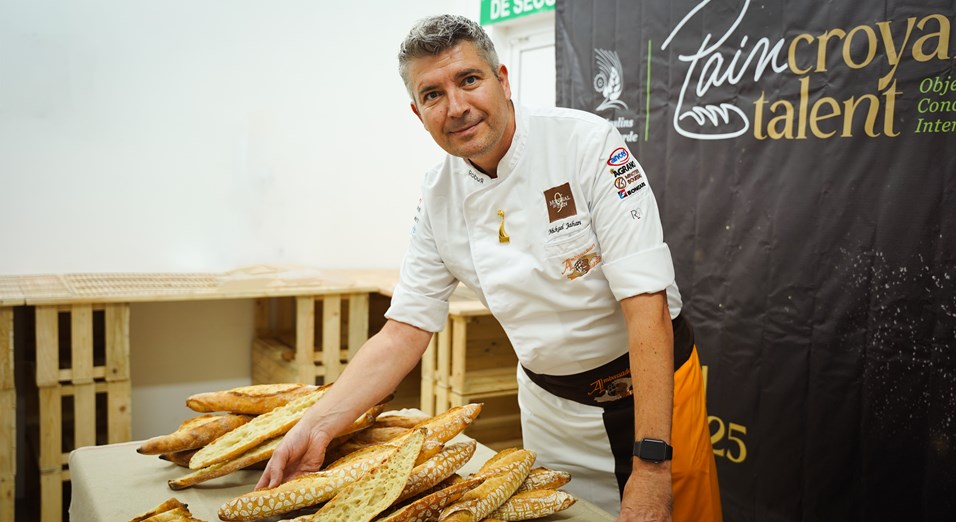Mickael Jahan, Bakery expert : "Bread is an art expressed through hands"

What does participating in the Pain'Croyable Talent competition in Mauritius as a representative of the Ambassadors of Bread mean to you?
Participating in and attending the Pain'Croyable Talent competition in Mauritius is a great honor. The warm welcome I received here has been truly touching. It's an extraordinary moment to see Mauritius preparing to participate for the first time in the 2025 World Bread Championship. This competition is unique, and my role here is to ensure everything goes smoothly under the banner of the Ambassadors of Bread. The participants have truly showcased their talents, making this event remarkable over the past three days.
What key criteria will you consider as the jury president when evaluating the participants?
I believe that a person's work reflects their personality, which I find fascinating to observe. Of course, there's a scoring system, and the more beautiful the product, the higher the points it receives. But beauty alone isn't enough—the taste must also be up to par. Behind every product is the art taught to these bakers, which they then express through their hands and creative processes. I focus on these aspects, which may differ from those of others. Although I have my own ideal vision, I am not the only judge. Ultimately, the collective scores of all the judges will determine the winner, but I hope my intuition aligns with the final decision.
What are your expectations for this competition in Mauritius?
Mauritius has enormous potential, but there's still work to be done, especially as this is the country's first time participating in this competition. It's crucial to select and support the two talents who will represent Mauritius at the 2025 World Bread Championship. Preparing them for this prestigious event is of utmost importance.
You provided training on the "Respectus Panis" method. What does it involve?
The "Respectus Panis" method is essentially a return to the roots—a revival of traditional practices. It involves using pure ingredients, such as native flours without additives, less salt, more water in some cases, and most importantly, time. In a world where time is precious, this method takes us back to an era with fewer mechanized aids and emphasizes the importance of good ingredients, proper techniques, and the necessary know-how to create exceptional bread.
As a trainer, what aspects of the "Respectus Panis" method do you most enjoy passing on to bakers?
I particularly enjoy conveying the tactile aspect of this method. Bakers are used to handling dough every day, but the fragility of the dough in this method is unique. It requires establishing a deep connection—a symbiosis—with the dough. This touch develops gradually and allows bakers to truly understand and master the reactions and nuances of the dough over time.
How do you see the future of artisanal baking in an increasingly industrialized world?
The challenge for artisanal baking is not unique to Mauritius—it's a global issue. Quality in the artisanal sector varies, and those who excel will continue to meet customer demand. However, large industrial structures with significant R&D resources are advancing rapidly. Yet, artisans have their secrets, unique skills, and a loyal clientele that specifically seeks their products. The key is to maintain that special connection with customers.
How do you see consumer tastes evolving in terms of bread, and how can artisans adapt to these changes?
In England, they often say "less is more," which I think resonates here as well. Technological advancements have pushed bakers to constantly innovate and expand their offerings, often leading to a complex and overwhelming product range. However, trying to please everyone can result in shortcuts and confusion. My advice is to simplify the offering, focus on quality, and respond to specific demands. This approach ensures consistency and customer satisfaction, leading to a sustainable business.
In your opinion, how important is continuous training for bakers?
Continuous training is vital. It's easy to be content with what you've already learned, but there's always room for improvement. Even if you think you've reached the top, there's always someone better or a company with more resources. Training helps you stay up to date with the latest techniques, ingredients, and trends, allowing you to adapt and innovate. It's essential to remain relevant in an ever-evolving industry.
Do you have a memorable experience or story related to your baking career that you'd like to share?
Yes, my early years in the trade were quite challenging. I started my apprenticeship at 13 and a half, and those first three years were tough. The training was rigorous, and I often wondered if I was truly learning something meaningful. Over time, I realized the importance of not only mastering the trade but also understanding the human element in training. The difficulties I encountered motivated me to become a teacher who emphasizes understanding, communication, and support—elements that I lacked in the beginning. Perseverance and the will to learn are essential, and it's crucial to have mentors who are genuinely invested in passing on their knowledge.
Any final words?
I would like to thank Eclosia and Les Moulins de la Concorde for inviting me to this competition. I have been truly impressed by what I've seen so far—the enthusiasm of the participants and the warmth of the people here. The smiles on everyone's faces are a testament to the positive energy surrounding this event. It's a beautiful thing, and it's something that should be preserved.
Who is Mickael Jahan?
Mickael Jahan is a bakery expert and breadmaking consultant. He is the founder of Mickael's Bakehouse, a company specializing in bakery consulting and mentoring. He also represents the Ambassadors of Bread, an international association dedicated to promoting quality and excellence in breadmaking. In addition to these roles, Mickael Jahan is often involved in professional events, such as competitions and training sessions, where he shares his expertise in breadmaking techniques, including the Respectus Panis method.
